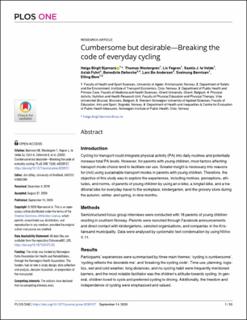Cumbersome but desirable—Breaking the code of everyday cycling
Bjørnarå, Helga Birgit; Westergren, Thomas; Fegran, Liv; te Velde, Saskia J.; Fyhri, Aslak; Deforche, Benedicte; Andersen, Lars Bo; Berntsen, Sveinung; Bere, Elling Tufte
Peer reviewed, Journal article
Published version
Permanent lenke
https://hdl.handle.net/11250/2687728Utgivelsesdato
2020Metadata
Vis full innførselSamlinger
- Import fra CRIStin [3604]
- Institutt for idrett, kosthald og naturfag [1006]
Originalversjon
Bjørnarå, H. B., Westergren, T., Fegran, L., te Velde, S. J., Fyhri, A., Deforche, B., … Bere, E. (2020). Cumbersome but desirable: Breaking the code of everyday cycling. PLOS ONE, 15(9). 10.1371/journal.pone.0239127Sammendrag
Introduction
Cycling for transport could integrate physical activity (PA) into daily routines and potentially increase total PA levels. However, for parents with young children, most factors affecting transport mode choice tend to facilitate car use. Greater insight is necessary into reasons for (not) using sustainable transport modes in parents with young children. Therefore, the objective of this study was to explore the experiences, including motives, perceptions, attitudes, and norms, of parents of young children by using an e-bike, a longtail bike, and a traditional bike for everyday travel to the workplace, kindergarten, and the grocery store during the autumn, winter, and spring, in nine months.
Methods
Semistructured focus group interviews were conducted with 18 parents of young children residing in southern Norway. Parents were recruited through Facebook announcements and direct contact with kindergartens, selected organisations, and companies in the Kristiansand municipality. Data were analysed by systematic text condensation by using NVivo V.11.
Results
Participants’ experiences were summarised by three main themes: ‘cycling is cumbersome’, ‘cycling reflects the desirable me’, and ‘breaking the cycling code’. Time use, planning, logistics, wet and cold weather, long distances, and no cycling habit were frequently mentioned barriers, and the most notable facilitator was the children’s attitude towards cycling. In general, children loved to cycle and preferred cycling to driving. Additionally, the freedom and independence of cycling were emphasised and valued.
Conclusion
In challenging weather conditions, parents of young children may experience cycling as cumbersome but desirable, and bike access could increase the feasibility of daily cycling.

